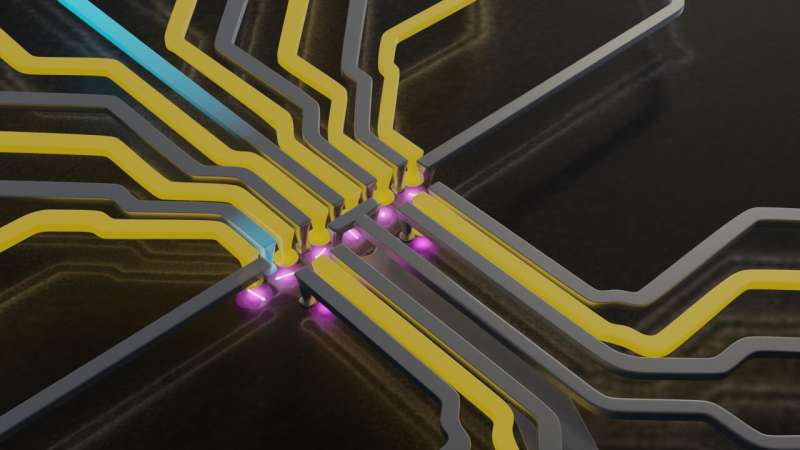First demonstration of universal control of encoded spin qubits

HRL Laboratories, LLC, has published the first demonstration of universal control of encoded spin qubits. This newly emerging approach to quantum computation uses a novel silicon-based qubit device architecture, fabricated in HRL’s Malibu cleanroom, to trap single electrons in quantum dots. Spins of three such single electrons host energy-degenerate qubit states, which are controlled by nearest-neighbor contact interactions that partially swap spin states with those of their neighbors.
Posted online ahead of publication in the journal Nature, the HRL experiment demonstrated universal control of their encoded qubits, which means the qubits can be used successfully for any kind of quantum computational algorithm implementation. The encoded silicon/silicon germanium quantum dot qubits use three electron spins and a control scheme whereby voltages applied to metal gates partially swap the directions of those electron-spins without ever aligning them in any particular direction. The demonstration involved applying thousands of these precisely calibrated voltage pulses in strict relation to one another over the course of a few millionths of a second. The article is entitled “Universal logic with encoded spin qubits in silicon.”
The quantum coherence offered by the isotopically enriched silicon used, the all-electrical and low-crosstalk-control of partial swap operations, and the configurable insensitivity of the encoding to certain error sources combine to offer a strong pathway toward scalable fault tolerance and computational advantage, major steps toward a commercial quantum computer.
“Beyond the obvious challenges of design and fabrication, a lot of robust software had to be written, for example to tune up and calibrate our control scheme,” said HRL scientist and first author Aaron Weinstein. “Significant effort was placed in developing efficient, automated routines for determining what applied voltage led to what degree of partial swap. Since thousands of such operations had to be implemented to determine error levels, each one had to be precise. We worked hard to get all that control working with high precision.”
“This was very much a team effort,” said HRL group leader and co-author Mitch Jones. “The enabling work of talented control software, theory, device growth and fabrication teams was crucial. Additionally, many measurements of devices were needed to understand enough of the internal physics and to develop routines to reliably control these quantum mechanical interactions. This work and demonstration is the culmination of those measurements, made all the better by the time spent working alongside some of the brightest scientists I’ve met.”
“It is hard to define what the best qubit technology is, but I think the silicon exchange-only qubit is at least the best-balanced,” said Thaddeus Ladd, HRL group leader and co-author. “Real challenges remain in improving error, scale, speed, uniformity, crosstalk, and other aspects, but none of these requires a miracle. For many other kinds of qubits, there is at least one aspect that still looks really, really hard.”
Once realized at scale, quantum computers would differ from traditional supercomputers in that they use a fragile feature of quantum mechanics called quantum entanglement to perform certain calculations in a very short time that would take traditional computers years or decades. Among many possible applications, one example computation is to simulate the behavior of large molecules.
Only a small amount of data is needed to describe the atoms in a molecule, but a very large working space is needed to calculate all the quantum mechanical states that electrons in the molecule might have. Quantum chemistry simulations could dramatically impact many technology directions from materials development to drug discovery to the development of processes for mitigating climate change.
More information:
Aaron J. Weinstein et al, Universal logic with encoded spin qubits in silicon, Nature (2023). DOI: 10.1038/s41586-023-05777-3
Provided by
HRL Laboratories
Citation:
First demonstration of universal control of encoded spin qubits (2023, March 7)
retrieved 7 March 2023
from https://phys.org/news/2023-03-universal-encoded-qubits.html
This document is subject to copyright. Apart from any fair dealing for the purpose of private study or research, no
part may be reproduced without the written permission. The content is provided for information purposes only.
For all the latest Science News Click Here
For the latest news and updates, follow us on Google News.

